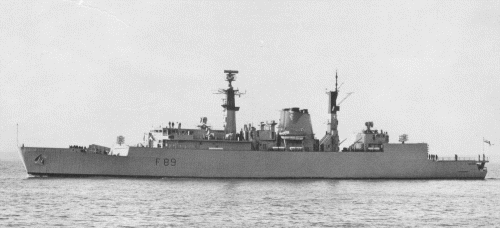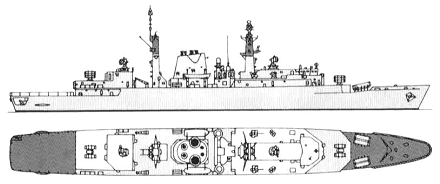
NAVYPEDIA
 Support the project with paypal
Support the project with paypal
Photo

Battleaxe 1980 Many thanks to Wolfgang Stöhr for additional information on this page.
Ships
| Name | No | Yard No | Builder | Laid down | Launched | Comp | Fate |
|---|---|---|---|---|---|---|---|
| Broadsword | F88 | 1016 | Yarrow SB, Scotstoun | 7.2.1975 | 12.5.1976 | 4.5.1979 | to Brazil 6.1995 (Greenhalgh) |
| Battleaxe | F89 | 1017 | Yarrow SB, Scotstoun | 4.2.1976 | 18.5.1977 | 28.3.1980 | to Brazil 4.1997 (Rademaker) |
| Brilliant | F90 | 1018 | Yarrow SB, Scotstoun | 25.3.1977 | 15.12.1978 | 15.5.1981 | to Brazil 8.1996 (Dodsworth) |
| Brazen | F91 | 1019 | Yarrow SB, Scotstoun | 18.8.1978 | 4.3.1980 | 2.7.1982 | to Brazil 11.1994 (Bosísio) |
Technical data
| Displacement standard, t | 3900 |
|---|---|
| Displacement full, t | 4400 |
| Length, m | 125.0 wl 131.2 oa |
| Breadth, m | 14.8 |
| Draught, m | 4.30 hull 6.00 sonar dome |
| No of shafts | 2 |
| Machinery | COGOG: 2 Rolls-Royce Olympus TM3B gas turbines / 2 Rolls-Royce Tyne RM1A gas turbines |
| Power, h. p. | 54600 / 8200 |
| Max speed, kts | 29 |
| Fuel, t | gas turbine oil |
| Endurance, nm(kts) | 4500(18) |
| Armament | F88, 89: 4 x 1 Exocet MM38 SSM (4 MM38/GWS50), 2 x 6 Sea Wolf GWS25 Mod.0 SAM (60 Sea Wolf), 2 x 1 - 40/60 Mk 9, 2 x 1 - 20/90 GAM-B01, 2 helicopters (Lynx) F90, 91: 4 x 1 Exocet MM38 SSM (4 MM38/GWS50), 2 x 6 Sea Wolf GWS25 Mod.0 SAM (60 Sea Wolf), 2 x 1 - 40/60 Mk 9, 2 x 1 - 20/90 GAM-B01, 2 x 3 - 324 STWS.2 TT, 2 helicopters (Lynx) |
| Electronic equipment | type 967/968, 2x type 910, type 1006 radars, type 2016 sonar, UAA-1, 2x type 670 ECM suites, 2x Corvus decoy RL, 2x DEC laser-dazzlers, type 182 torpedo decoy, CAAIS CCS |
| Complement | 239 |
Standard scale images

Broadsword 1980
Graphics
Project history
Originally conceived as a follow-on to the Leander class and intended to be built for the Royal Netherlands Navy as well, the Type 22 design was forced to grow to meet new threats and to accommodate new technology. The increasing inability of medium-range active sonars to cope with fast nuclear submarines led to the development of a new 'fleet' sonar, capable of long-range passive detection and use of convergence zones and 'bottom-bounce' techniques. The threat from Malakhit 'pop-up' missiles dictated the development of Sea Wolf anti-missile system, and finally the creation of the SOSUS barriers of underwater listening arrays in the GIUK Gap required a ship with a high degree of autonomy and good seakeeping.
As a result the Broadsword hull had much more freeboard than the Sheffield class DDG, a double hangar to accommodate a second Lynx (a late addition), a double-headed Sea Wolf system, and a main armament restricted to four MM38 Exocet SSM. The hull was in fact an expansion of the original Type 12 design, intended to be driven in rough weather with little reduction in speed. The processing equipment needed for all this required seven computers, but there was another reason for the spaciousness: experience has shown that maintenance is the biggest headache in a warship, and that the 'payload' has to be updated once or even twice in the lifetime of the 'platform' or hull. Thus the Broadsword design left additional space for future growth, in much the same way as the American Spruance design.
Although rated as frigates they were bigger than the DDGs, and proved magnificent ASW ships. They were to be fitted with the Type 2031Z towed array, but the weight of the winch would have strained the hull girder. The enormous number of inputs from towed arrays also showed that the original Type 22 AlO was not big enough for the task. Large as these ships were, a second 'stretched' batch was ordered. For the first time the lead yard received all subsequent orders, as it is now recognised that this saves a considerable amount of time and money.
Modernizations
1980-1982, Broadsword, Battleaxe: + 2 x 3 - 324 STWS.2 TT
1982-1983, all: + 2x Mk 36 SRBOC decoy RL
late 1980s, all: - 2 x 1 - 40/60; + 2 x 2 - 30/75 GCM-A02
late 1980s, Broadsword, Brilliant; early 1990s, Battleaxe: - type 2016 sonar; + type 2050 sonar
Naval service
In 1988-89 both Broadsword and Battleaxe were refitted by DML, with new funnels similar to their later sisters and additional accommodation for training. In 1991 it was suggested that these fine ships might be offered for sale, and in November 1994 all four were bought by Brazil.
Many thanks to Wolfgang Stöhr for additional information on this page.
 HOME
HOME FIGHTING SHIPS OF THE WORLD
FIGHTING SHIPS OF THE WORLD UNITED KINGDOM
UNITED KINGDOM ESCORTS
ESCORTS BROADSWORD frigates (1979 - 1982)
BROADSWORD frigates (1979 - 1982)
